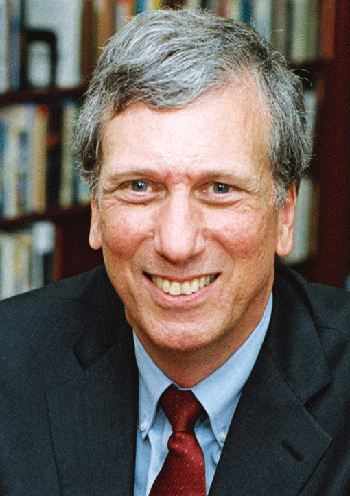Arnold Eisen, the new head of the Jewish Theological Seminary, will speak at Adath Jeshurun on Nov. 18, as part of the congregation’s 125th anniversary celebration
By MORDECAI SPECKTOR
Adath Jeshurun Congregation is celebrating its 125th anniversary, and has scheduled a number of events to mark the historic milestone. This past weekend the synagogue hosted a weekend with Joshua Nelson, the energetic “kosher gospel” singer. The next notable occasion for the Minnetonka shul will be a conversation with Chancellor Arnold M. Eisen of the Jewish Theological Seminary. Eisen will speak on “Renewing American Judaism: The Time Is Now” 7:30 p.m. Wednesday, Nov. 18 at the synagogue.
In an interview with the American Jewish World last week from his office in New York City, Eisen discussed the remarkable longevity and vitality of Adath Jeshurun, the challenges facing his seminary, which trains rabbis and cantors, and the Conservative movement generally.
In a preview of the talk he will deliver here, Eisen, who took the top spot at JTS in 2007, said “there are two aspects of the present situation of American Judaism — one of them is obvious and one of them is not. The one that is obvious is the difficulty; some people call it a crisis.”
The crisis is financial and organizational; the Conservative movement is “losing a large number to assimilation,” allows Eisen, who is not a rabbi but an esteemed scholar of American Judaism. “There is a sense that we are not meeting the needs of the younger generation.”
In his travels and talks with rabbis, cantors and Conservative lay leaders, Eisen has found a sense of urgency about doing something to address the exodus of youth from synagogue life. “If we don’t get this younger generation now, we’re going to lose them,” he said, paraphrasing the message from Conservative leaders.
And in the current economic downturn, Eisen notes that the Conservative movement’s ability to create programs to appeal to youth has butted up against budget constraints. “So when you want to reach a younger generation, you want to spend more money on Jewish education, not less,” says Eisen.
He also mentions the “M” word — Madoff, although he was speaking generally about the finances of Jewish institutions; JTS did not invest its funds in the Madoff firm and was not affected by the demise of the massive Ponzi scheme that wrecked numerous Jewish organizations and foundations.
 Arnold Eisen: Judaism is suited to the present time and this generation. (Photo: Courtesy of Adath Jeshurun)
Arnold Eisen: Judaism is suited to the present time and this generation. (Photo: Courtesy of Adath Jeshurun)
Getting to the second aspect of his American Jewish overview, Eisen said that “what is not visible to many people, this is an incredible time of opportunity.” There are still significant financial and institutional resources, including “the young talent that is going into the service of the Jewish community. They are choosing to be Jewish professionals, clergy, educators and lay leaders.”
“The time is now,” according to Eisen, to present an excellent “product” to American Jews: “a tradition called Judaism, Torah; it’s wonderful and suited to the present time and this generation. It’s an open-minded tradition; it’s a tradition of tolerance and respect for other traditions. It prizes intellectual achievement. It prizes community, as well as individual fulfillment.”
JTS can help in the marketing of Judaism, so to speak, because the synagogue “is and will remain the key institution of American Judaism… and the rabbi is the key leader of that institution, and JTS is training a new generation of rabbis in a new way.”
Eisen said that JTS has revised its curricula, and established a “state-of-the-art center for continuing pastoral education” for JTS students, other rabbinical students and “clergy from other traditions.”
Regarding the drift of youth away from Conservative shuls, Eisen stressed that there is a new focus on maintaining the “academic rigor” in the study of Jewish texts, while emphasizing how the teaching of those texts is accomplished so that young religious school students are inspired. “We’re also paying more attention to the spiritual development of the rabbinical students themselves, and of the cantorial students, and of the education students, figuring that they then have to nurture other spirits,” adds Eisen.
Rabbi Harold Kravitz, senior rabbi at Adath Jeshurun, is looking forward to Eisen’s talk next week. The congregation over its long history — chronicled in a recently published large-format book, 125 Years of Adath Jeshurun Congregation, by Etta Fay Orkin and Deborah Tolmach Sugerman (7-24-09 AJW) — has always been about “how to maintain people’s commitment to Judaism, to learning, to observing Judaism, to making it very much part of their lives, and also to get people to be good people, to be good human beings,” Kravitz comments.
He adds that the synagogue’s Hebrew name, Adath Jeshurun, means the “Gathering of the Righteous.” Kravitz says, “It’s what we aspire to be. You can’t promise that we always live up to that name, but that is always what we aspire to be.”
In the spiritual smorgasbord of American life, Adath Jeshurun, along with all congregations, is wrestling with how to promote Jewish commitment and menschlichkeit, good conduct. Kravitz mentions that Chancellor Eisen is “thinking about these same issues for our movement, for American Judaism and Judaism as a whole, in the 21st century… He’s thinking about these issues at a very high level. We’re excited to have the opportunity to hear his take on these issues and celebrate with us as we reach 125 years.”
***
Chancellor Arnold Eisen of Jewish Theological Seminary will speak 7:30 p.m. Wednesday, Nov. 18 at Adath Jeshurun Congregation, 10500 Hillside Ln. W., Minnetonka. The event is free and open to the community. For information, call Ӭ952-545-2424.









 Arnold Eisen: Judaism is suited to the present time and this generation. (Photo: Courtesy of Adath Jeshurun)
Arnold Eisen: Judaism is suited to the present time and this generation. (Photo: Courtesy of Adath Jeshurun)










Comments 0